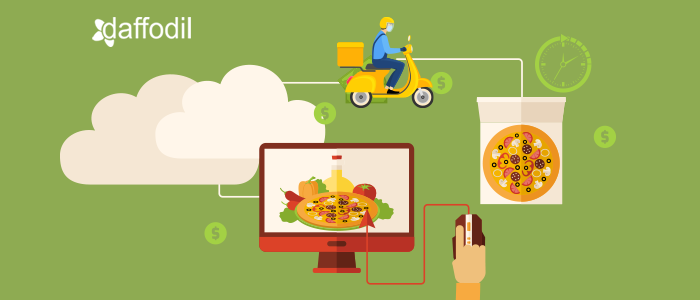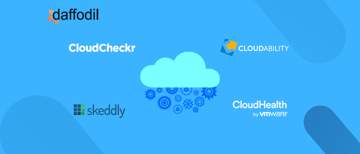
When the COVID pandemic hit the world, nobody could gauge the magnitude of devastation it would cause businesses. Amongst the various sectors that were grossly affected by COVID-19 was Food & Beverage. The global lockdown resulted in the shutdown of restaurants and other eateries, which consequently gave rise to new foodpreneurs and viable concepts that could let the people enjoy their favorite delicacies at home. One such concept is ‘Cloud Kitchen’ and experts could foresee it as the future of the food industry.
A cloud kitchen is a delivery-only restaurant with no space to dine. The food is prepared to be delivered at doorsteps and the orders are taken via calls or food ordering apps.
This definition of cloud kitchen must have made you wonder- What’s new in it? We have been ordering food from various online food aggregator platforms. Then why the concept of cloud kitchen is such hype? Let’s redefine a cloud kitchen and understand why.
A cloud kitchen is a ‘virtual restaurant’ wherein there is flexibility to launch more than one brand but with the same infrastructure. Such a model allows the restaurateur to utilize the same kitchen and resources to operate multiple brands.
A perfect example of a cloud kitchen model is Rebel Foods in India. It operates 11 cloud kitchen brands with over 350+ cloud kitchens (as of March 2021).
What makes a Cloud Kitchen different from Restaurants?
One of the major differences between restaurants and cloud kitchen is that the latter does not have a dine-in space. A cloud kitchen only has space for food preparation and deals with the delivery of orders.
1. Ambience & Location
A restaurant should ideally be located in an area with high footfall and visibility. Also, it should have an ambiance created for the kind of people they need to serve. On the other hand, a cloud restaurant only needs a kitchen space, a delivery service, and good food to keep up with the consumers.
2. Cost Efficiency
When it comes to cost, cloud kitchen definitely wins over restaurants. In the case of cloud kitchen, a major chunk of investment goes into rent, interior or layout planning, safety approvals, etc. On the contrary, restaurants have to invest in a bigger space, better interiors, safety measures, parking space, etc. The overhead cost for a restaurant is way high than a cloud kitchen.
3. Profit Margins
The average profit margin for restaurants and cloud kitchen depends upon a number of factors, such as rent, payroll, advertising, utilities, or kitchen equipment repair, etc. Moreover, it completely depends upon the food margin that a restaurant and cloud kitchen is keeping. If we just go with the infrastructure, it would be the restaurant that would have less profit margin when compared to a cloud kitchen.
Different Types of Cloud Kitchen Model
In a cloud kitchen, an order is received, food is prepared, and is delivered to the customer’s doorstep. This is a traditional cloud kitchen model.
However, there are different types of cloud kitchen models, depending upon the way their operations are executed. Let’s discuss those business models.
1. Standalone Cloud Kitchen
Also called a single-kitchen or single brand model, this is actually the true cloud kitchen model. There is an independent kitchen where a brand owns or rents space to prepare food. It usually focuses on a single type of cuisine and relies on an aggregator or personalized app to get the order.
2. Multi-Brand Cloud Kitchen
In this model, there are multiple brands operating under one parent company. They share the same kitchen and every brand/restaurant specializes in a single type of cuisine. The kitchen is usually large (larger than a standalone kitchen) and is under one roof. Once the parent company can own multiple brands under it.
3. Commissary (or Aggregator) Kitchen
These are delivery app owned ‘shell’ or ‘stacked’ cloud kitchen. For small restaurant businesses, online delivery aggregators are renting kitchen space and infrastructure. These kitchens can be shared by different brands with an opportunity to use a fully stacked or a shell kitchen, depending on the requirement. So basically, this gives the facility to operate multiple, small-sized kitchens within a larger space under one roof.
4. Co-Working Cloud Kitchen
This type of cloud kitchen has a large infrastructure wherein multiple restaurant brands can run a business. In the co-working cloud kitchen model, the spaces are strategically defined and there are individual kitchen units for each brand, having the necessary equipment.
5. Outsourced Cloud Kitchen
In these kitchens, cooking and delivery are completely outsourced. The cloud kitchen buys and stores the raw material and then prepares the food in a centralized location. When an order is received, the food is sent to the kitchen for final touches. In an outsourced cloud kitchen, orders are received from multiple sources.
Who Should Think of Opening Cloud Kitchen?
Anybody with culinary skills can get started with a cloud kitchen. Anybody with the skills to run a business can get started with it. Let’s check out who can open a cloud kitchen.
1. Food Entrepreneurs
If you have an amazing idea and looking for a less expensive way to get into the market, then a cloud kitchen is the option for you. You can get started with relatively small kitchen space, not worrying much about interiors, ambiance, cutlery, parking, renting a space at a popular location, then having a cloud kitchen is certainly a great idea to go for.
2. Homegrown Food Brands
Homegrown food brands are a great hit amongst people who are looking for healthy and mindful diet options. If your brand is doing a decent business, then it’s time to expand it through a cloud kitchen. Direct business through your own kitchen means no commission to sell it on other portals or food stalls.
3. Food Truck Operators
If your food truck business is doing exceptionally well, then a cloud kitchen is the next step towards taking it to better heights. Get a customized app for your business or register yourself on food aggregator platforms to receive orders online.
4. Established Quick Service Restaurants
Quick Service Restaurants can make the most of delivery-only kitchens. They can expand their delivery services in order to deliver more orders on time.
5. Dine-In Restaurants
Dine-in restaurants, along with their offline services can expand their services online. All that they need is an efficient delivery staff and the same menu with some add-ons can work to give the restaurants better research. This can work like an advertisement which has got high chances to succeed. Because if people like the food, they would definitely want to try the food offline.
Moreover, with the COVID-19 pandemic bringing forth some uncertain conditions, it is important for restaurants to have a backup plan that can help their business survive, even in tough times. This also helps in resuming the services back on time, without losing the clientele.
Requisites for Launching a Cloud Kitchen
For planning to launch a virtual restaurant, there are a few key considerations. For example, since the order would be delivery-only, it is important to set up the kitchen in a location where the orders are to be delivered.
Similarly, it would be a great idea to go for a custom app development for your cloud kitchen. Since the profit margins are low, better to have a custom app for food ordering rather than going with aggregators where you have to pay a specific amount of commission. However, having a presence on the aggregator website gives better visibility. So for marketing propose, going with the aggregators can be an option for some time.
For a cloud kitchen app, go ahead with a plan. Our team will help you to create a roadmap so that you can sail seamlessly in the journey to get started with a new restaurant.



